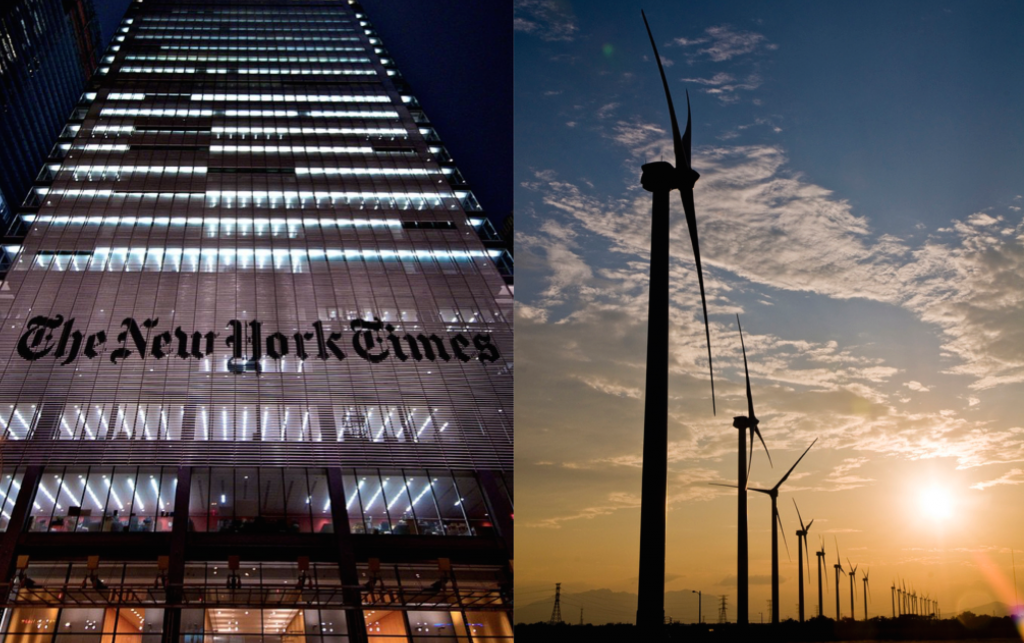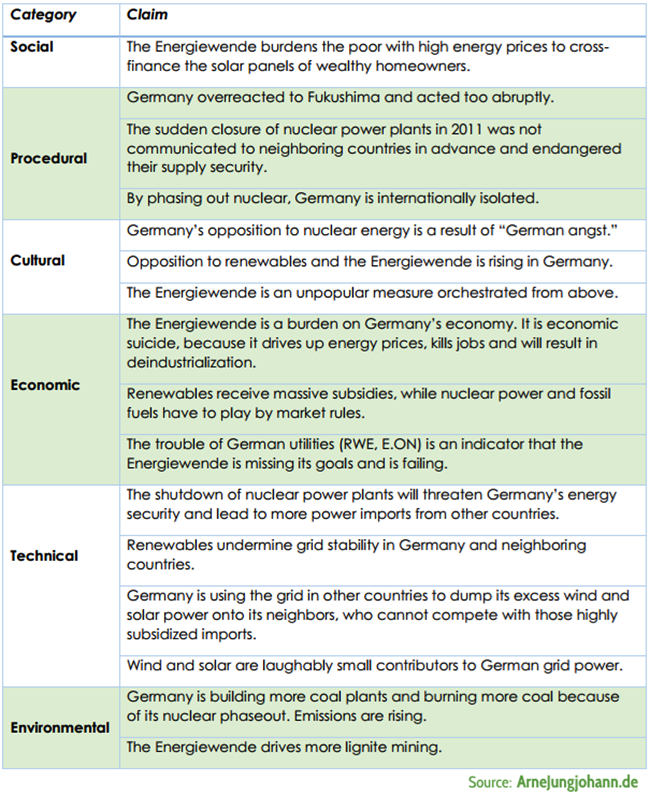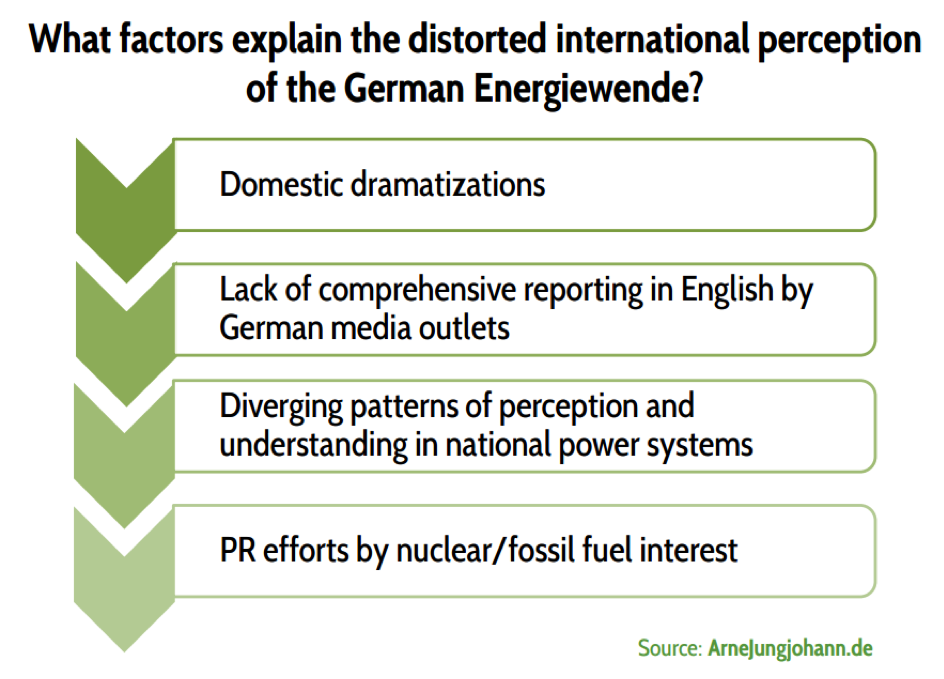If you are active on Twitter among the energy and climate geeks like Arne Jungjohann, you run across international coverage on Germany’s energy transition almost every day. Arne takes a thorough look at the international perceptions of the Energiewende.

The current misunderstandings about the Energiewende abroad call for a more proactive and target-oriented communication. (Photos by Paul Stocker and Walmart, modified, CC BY 2.0)
In single cases, the reporting is excellent (see for instance National Geographic). Some of the positive Energiewende reporting leaves the reader with the impression as if Germany was a lonely leader on a path to decarbonization of power production through the usage of distributed renewables. But of course, Germany is not going alone. The country has many ambitious allies around the globe like Denmark or California, which have even more ambitious goals than my home country of Germany.
However, the international Energiewende reporting makes me want to rub my eyes. If one is to believe those reports, industry is fleeing because energy costs are going through the roof. Since Germany’s supposed panic reaction to Fukushima and the shutdown of nuclear reactors in 2011, the country is allegedly increasingly dependent on power imports, and its grid is less stable than before. And those are just a few of the unfounded claims:

Graph 1 Typical claims that are being forwarded against the Energiewende.
Fact-checking reveals that the above statements are myths. Readers of this blog know that the Energiewende is neither an irrational reaction to Fukushima, nor unique in its ambitions. Nonetheless, these myths keep circulating through the international press. How can this divergent discourse be explained?
Four different factors help explain this divergence between the German and international understanding of the Energiewende:

- German politicians sometimes paint a bleak picture of Germany’s Energiewende in order to win over a specific audience or corner a constituency at home. German journalists can see through such tactics and distinguish fact from hyperbole, but it’s harder for foreign observers. An example? In April 2014, Energy Minister Sigmar Gabriel gave a speech at a national solar summit at which he claimed that the “German Energiewende is close to becoming a failure”. His purpose was to tell an audience of solar representatives that he had no choice but to cut support for solar. Abroad, a number of blogs and news outlets saw the minister’s quote as an official admission that the strategy of Germany’s energy transition was fundamentally flawed and bound to fail. They subsequently covered the story with unequivocal titles such as ”the green energy orgy in Germany is over.” Tellingly – the German press did not understand Gabriel’s statement that way.
- Few German media outlets cover energy politics in English comprehensively. Until recently, only a small part of the overall energy discourse in Germany reached the outside world in English at all. The result was selective reporting, as most English media outlets do not have their own reporters and fact-checkers on the ground to contextualize the news. One prominent example was a one-sided report by SPIEGEL ONLINE, for years the only major German news outlet available in English, which reported how electricity was supposedly becoming a luxury item in Germany. Subsequently, a number of foreign media outlets (such as the NYT) picked up the topic along with its skewed framing. Fortunately, over the last few years, more German media outlets have started offering news in English. In addition, a number of specialized actors appeared, offering professionalized information on the Energiewende in English specifically to foreign journalists and decision-makers.
- Still, misunderstandings can occur. Journalists, like everybody else, are socialized and operate in a specific political and cultural environment. A French reporter is most familiar with a power sector dominated by large nuclear interests, offering little room for input from ordinary citizens. Furthermore, French nuclear power has long been seen as a cornerstone of French industrial policy. In this context, recent developments in Germany can be hard to contextualize for French onlookers. German news on a renewable energy transition driven largely by small-scale, distributed community power does not fit into existing notions of centralized power generation. International onlookers therefore often ask how the government gets the public to accept its renewable energy policies, whereas the reverse is a better question: how does the public get the government to implement certain policies when energy corporations get hurt in the process.
- Finally, the nuclear and fossil-fuel firms impact public discourse. They provide financial support to a number of think tanks, universities, and research institutes. By doing so, the industry hopes to emphasize the continued importance of conventional energy. In their efforts to delegitimize the Energiewende, they readily rely on the afore-mentioned tactical hyperbole within the German debate and selective reporting in English to make their findings seem sound. Pointing out the spin requires more familiarity with the Energiewende than international readers generally have. Such reports argue, for instance, that the Energiewende is losing popular support – even as 93% of Germans continue to support the energy transition.
Communication on the Energiewende is improving
The current misunderstandings about the Energiewende abroad call for a more proactive and target-oriented communication. It is not enough to simply provide information. Instead, data, context and contacts need to be 1) specifically catered to the journalists and decision-makers around the globe; 2) provided in their mother-tongue; and 3) be as comprehensive as possible (including alerting to some of the difficulties) in order to reflect the true Energiewende story.
If Germany can demonstrate that there is a pathway for industrial economies into a post-fossil age, it will encourage others to follow suit. It would be a pity if Germany succeeded – but nobody heard about it.
Arne Jungjohann (@ArneJungjohann) is a political scientist and energy analyst. Together with Craig Morris he is co-authoring a history on Germany’s Energiewende which will be published in 2016.